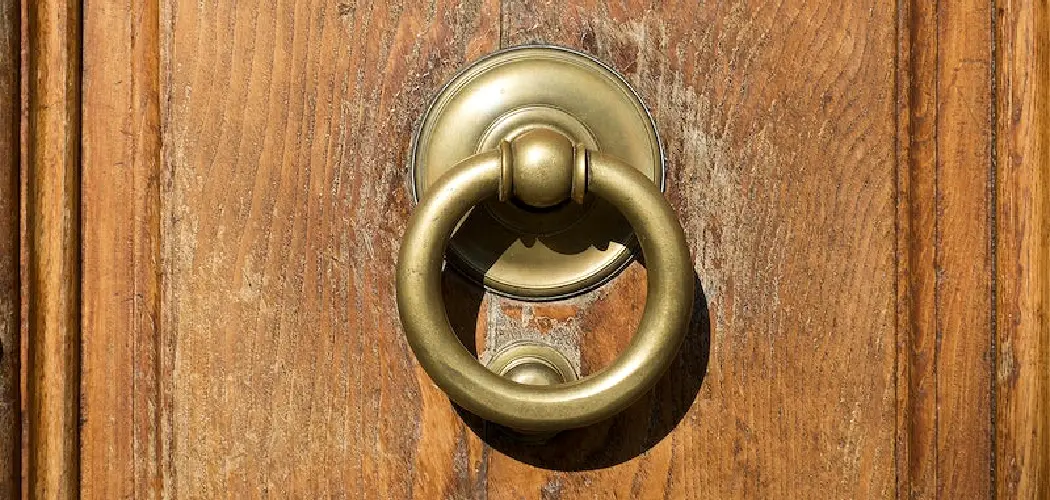Is a squeaky, creaking garage door driving you crazy? If the noise is making it hard to concentrate or disrupting your family’s peace and quiet, you need to find a solution. Unfortunately, many people think they have no choice but to put up with the racket, but that doesn’t have to be the case!
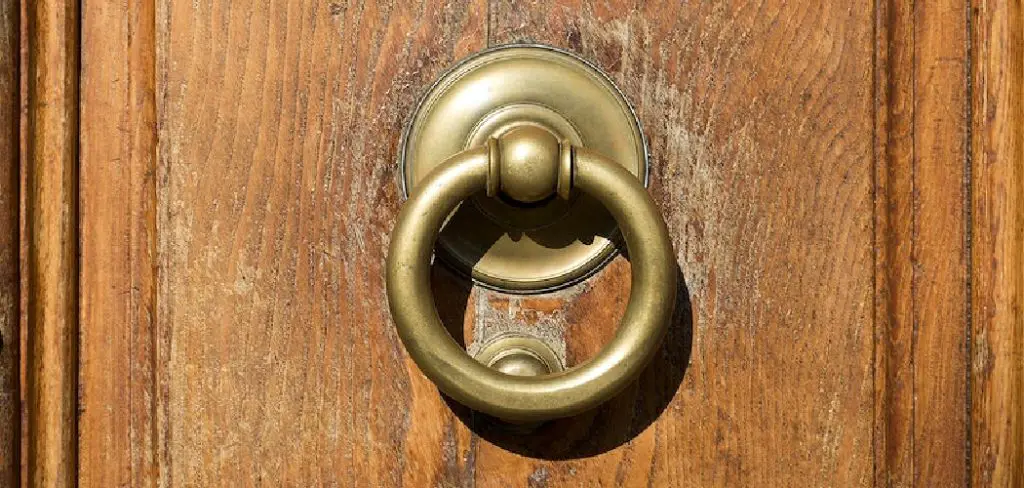
With some simple knowledge and skills in hand, anyone can easily fix their noisy garage door – all you need is an understanding of what causes this problem in the first place and how to stop a garage door from squeaking effectively.
In this blog post, we’ll explore why garage doors squeak and provide practical tips for making them quieter for good. So let’s get started on solving your doorway dilemma today!
Summary: Garage door squeaks can be caused by a wide range of issues, including worn-out hardware, improper alignment, or general disrepair. The best way to prevent and address a squeaking garage door is to lubricate all the moving parts with light oil or grease. Regularly inspect and tighten any loose screws or other hardware components, and replace any worn or broken parts with new ones.
What Is the Proper Lubricant for Garage Doors?
Garage doors are composed of several moving parts, and regular maintenance is important to ensure proper operation. One of the most effective ways to maintain your garage door is to lubricate its tracks, springs, and other components on a regular basis. Use a high-quality silicone-based lubricant to keep your garage door running quietly and smoothly.
If you’re unsure which type of lubricant to use, consult your garage door manufacturer’s instructions for specific recommendations. It’s important to note that it is not recommended to use oil-based lubricants on garage doors, as they can attract dirt and dust particles which can cause damage to the mechanisms over time.
When lubricating your garage door, be sure to apply the lubricant directly onto the components. Use a clean cloth or brush to spread the lubricant evenly across all moving parts of your garage door.
Be sure to get into any grooves and crevices for maximum coverage. Do not over-lubricate, as too much can cause buildup that will attract dirt and dust, eventually leading to a noisy and unresponsive door.
By properly lubricating your garage door and taking other preventive measures, such as cleaning the track regularly, you can avoid squeaking noises from forming in the future and keep your garage door functioning optimally for years to come.
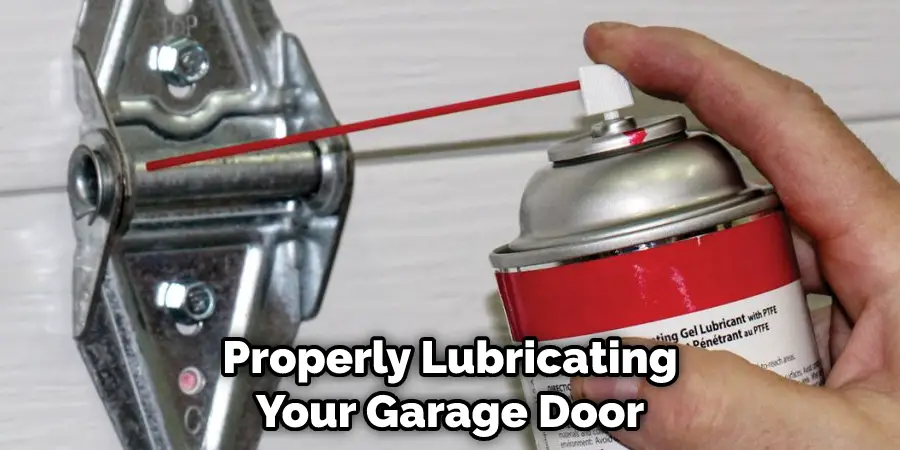
10 Methods on How to Stop a Garage Door from Squeaking
1. Lubricate the Rollers and Hinges
One of the most common causes of a squeaky garage door is dry rollers and hinges. In order to lubricate these parts, you will need to purchase a silicone-based lubricant. Apply the lubricant to the rollers and hinges, and then operate the door a few times to distribute the lubricant evenly. If the squeaking persists, continue to apply more lubricant until it is eliminated.
2. Tighten the Bolts and Screws
Another common cause of a squeaky garage door is loose bolts and screws. Use a wrench or screwdriver to tighten any bolts or screws that are loose. Be sure not to over-tighten the bolts, as this can damage the door. Additionally, check for any missing bolts or screws and replace them if necessary.
If your garage door has rollers, ensure that the roller brackets are also secure. If you notice any broken or missing brackets, replace them right away. Lastly, make sure the hinges are secure and well-lubricated. If the hinges are rusty or showing signs of wear and tear, replace them. This will help reduce squeaking and keep your garage door operating smoothly.
3. Clean the Tracks
If your garage door tracks are dirty, they can cause the door to squeak when it is opened or closed. To clean the tracks, use a vacuum to remove any dirt, dust, or debris. You can also use a damp cloth to wipe down the tracks.
Once you have finished cleaning the tracks, lubricate them with a silicone-based spray or lightweight machine oil. This should help reduce the amount of noise produced by the door. Finally, check that the tracks are aligned properly to ensure the garage door is moving freely and without obstruction.
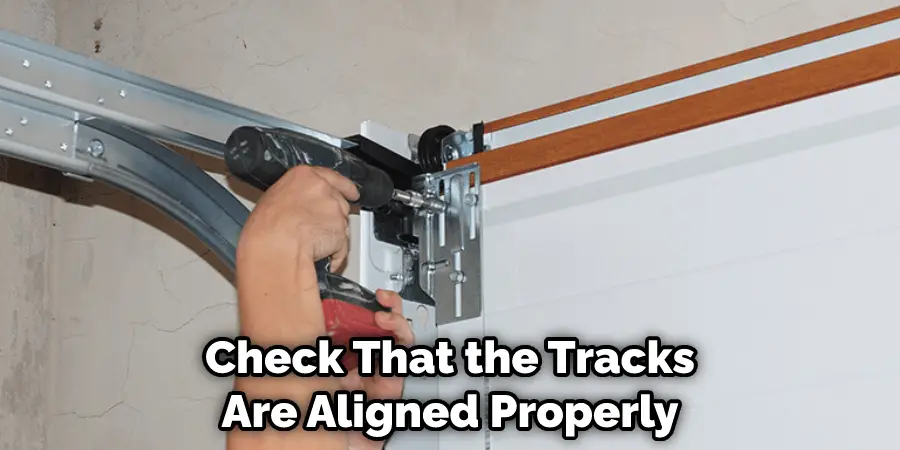
4. Replace Worn Out Parts
If your garage door is squeaking due to worn-out parts, you will need to replace those parts in order to stop the noise. Common parts that may need to be replaced include rollers, hinges, springs, and cables.
You can purchase replacement parts from your local hardware store or online. Be sure to check the manufacturer’s instructions for the proper installation of new parts. You may also want to consider hiring a professional technician to install the new parts for you in order to avoid damaging the door.
5. Adjust the Door Opener
If your garage door opener is causing your door to squeak, you may need to adjust its tension settings. Consult your owner’s manual for instructions on how to do this. If you cannot locate the manual, contact your local garage door repair company for assistance.
They can help adjust the tension settings and ensure that your opener is functioning properly. Keeping the opener in good working order can help reduce or eliminate your garage door’s squeaks.
6. Lubricate the Door Opener Chain
If your garage door opener has a chain, it may be causing your door to squeak when it is opened or closed. To lubricate the chain, you will need to purchase a silicone-based lubricant designed for chains.
Apply the lubricant to the chain, and then operate the door a few times to distribute it evenly. Be sure to wipe away any excess lubricant and dispose of all rags or materials properly. With proper lubrication, your door should no longer squeak when it is opened or closed.
7. Check the Weatherstripping
If your garage door has weatherstripping, it may be causing it to squeak. If this is the case, you will need to replace the weatherstripping. You can purchase replacement weatherstripping from your local hardware store or online.
Be sure to measure your door before buying the weatherstripping, so you purchase the correct size. If the weatherstripping is damaged or worn, it will cause the garage door to squeak when it opens and closes.
8. Use WD-40
If you can’t find a silicone-based lubricant, you can also use WD-40 to stop your garage door from squeaking. Just spray some of the product onto the moving parts of your door and operate it a few times to distribute the lubricant evenly.

The WD-40 will help reduce friction and, thus, squeaking. It’s important to remember that WD-40 should be applied only as a temporary measure – it is not a long-term solution. Therefore, you’ll need to reapply the product periodically to keep the door from squeaking.
9. Inspect for Bent Tracks
If your garage door track is bent, it can cause the door to squeak when it is opened or closed. To fix this problem, you will need to straighten out the track using a pry bar or hammer. To ensure the track is straight, use a level and check it at different points along the length of the track.
If you are not able to fix the bent track yourself, contact a professional garage door repair company for assistance. While you have them at your home, you can also ask them to inspect the rest of the door for any other issues that may be causing a squeak.
10. Replace Springs and Cables
If your garage door springs or cables are worn out, they can cause your door to squeak. To fix this problem, you will need to replace the springs and cables. You can purchase replacement parts from your local hardware store or online.
When replacing these parts, make sure that you follow the instructions provided with the replacement parts. If you are not comfortable doing this work yourself, hire a professional to do the job for you. This will ensure that the springs and cables are properly installed, reducing the chance of them breaking or causing your garage door to squeak.
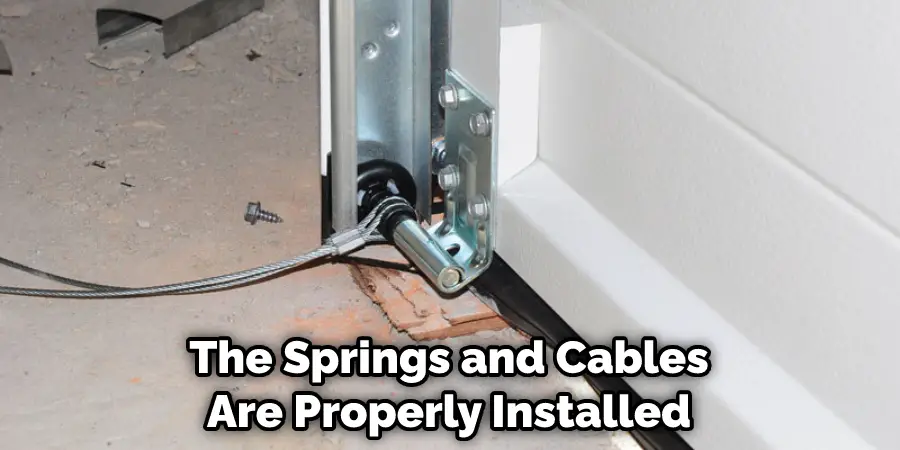
By taking these steps, you should be able to stop your garage door from squeaking and ensure that it continues to open and close properly for years to come. If all else fails, contact a professional garage door repair company for assistance. With their help, you can enjoy a squeak-free garage door in no time!
Can You Use Wd-40 to Lubricate a Garage Door?
Yes, you can use WD-40 to lubricate a garage door. This product is specifically designed to provide lubrication and protection from rust and corrosion. WD-40 can be used for a variety of applications, including lubricating garage door tracks and rollers.
To use it, spray the product onto the moving parts such as hinges, rollers, and springs. Let the product soak into the area for 15 to 20 minutes before operating your garage door again. Repeat this process every six months to keep your garage door running smoothly and without any squeaking.
Conclusion
The moral of the story is that garage doors squeak for a variety of reasons. However, there are some common threads between all those reasons – typically, it’s something to do with the hardware. By applying WD-40 or tightening up screws, you can fix most garage door squeaks easily and quickly.
So don’t ignore that annoying sound – find out what’s causing it and take care of it as soon as possible! We hope this guide on how to stop a garage door from squeaking was helpful. Please share it with your friends on social media if you find it useful. And be sure to check back here soon for more informative guides like this one.

